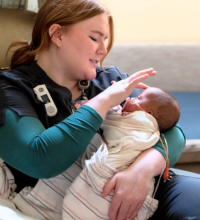Music therapy comforts Banner Children’s tiniest patients
09/06/2023
Program aids sick and premature infant development
Part of Sarra Erb’s role as a board-certified music therapist at Banner Children’s at Desert involves singing to sick and premature infants in the Neonatal Intensive Care Unit. Erb is specially trained to use her melodic voice to soothe them along with a calming touch to counterbalance the occasional poking and prodding necessary for lifesaving or life-sustaining treatment.
Studies have shown music therapy helps infants leave the NICU faster and require less medicine during treatment.
In the NICU, Erb quietly sings “Twinkle, Twinkle, Little Star” to Boston Cervantes, who weighed only 1 lb. 8 oz. at birth last fall. An ever-present electronic monitor beeps and blips nearby, providing its own background music as it tracks Boston’s heartbeat and oxygen levels.
“We’re helping them learn that not all touch is bad, by providing positive reinforcement through singing or humming while doing ‘light touch,’ so they won’t be fearful of sensory experiences as they grow,” said Erb.
Erb makes the same gentle motions 10 times in the same area, such as on Boston’s head or cheek, so she’ll learn to know what’s coming next and develop trust. Erb sings each nursery rhyme five to 10 times in a row for the same reason.
Studies have shown music therapy helps infants leave the NICU faster and require less medicine during treatment. It helps improve the way babies process information, increases developmental opportunities, and promotes self-calming behavior.
Boston’s mom, Alicia Cervantes of Mesa, said music therapy has made quite a difference in her daughter’s growth. “She is the happiest baby,” Cervantes said. “I want to thank God for the healing hands at Banner Desert.”
Erb can sing to infants as young as 28 weeks, though she doesn’t hold them or introduce light-touch techniques until about 32 weeks, since they’re still developing their senses during that time. Her role in the NICU becomes especially important when parents are unable to be at the infant’s bedside for a long period of time.
The music therapy program at Banner Children’s helps bring normalcy to the hospital environment for children, creating meaningful activities to engage kids and help them better communicate throughout treatment. Each session is catered to the specific needs of each child. Erb works with children ages 17 and younger at their bedside and in Sophie’s Place, a dedicated space at Banner Desert that includes a recording studio, listening area, and practice areas for music therapy.
A long-term patient at Banner Children’s at Desert throughout his childhood, Nathaniel Ross, 22, spent weeks at a time hospitalized, including every major holiday, for more than a decade. And yet he looks back fondly on aspects of his health care journey, particularly the positive impact of integrative services like music therapy. “I learned to play the guitar while I was in the hospital,” he says, joyfully. Piper Powell, a 9-year-old cancer patient now in remission, learned to play the ukelele throughout her hundreds of days of hospitalizations.
Music therapy is just one “extra” that is fully funded by philanthropy at Banner Health. Without charitable gifts, this program that adds so much to our patients’ quality of life might not exist. And now, much younger patients are also benefitting on an even deeper level from the gift of music.
Sarra’s unique work with NICU babies caught the attention of local Arizona news programs, and most recently, on a national level when Good Morning America published a video of her singing to infants.
